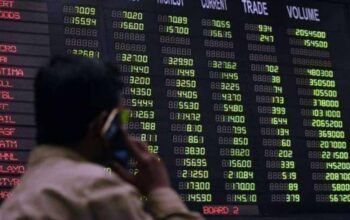By Staff Reporter
ISLAMABAD: Pakistan and the United States are racing to finalise trade negotiations next week to head off steep tariffs that could derail Islamabad’s fragile economic recovery.
The talks, held virtually between Finance Minister Muhammad Aurangzeb and US Commerce Secretary Howard Lutnick, are part of a broader effort to recalibrate economic ties amid shifting geopolitical tensions and President Donald Trump’s aggressive trade policies.
“Both sides showed satisfaction on the ongoing negotiations and resolved to conclude the trade negotiations next week,” finance ministry said in a statement on Wednesday.
The discussions, which also touched on a longer-term strategic and investment partnership, “focused on meaningful engagement in trade, investment and deepening economic ties mutually beneficial to both sides, with technical-level trade-related discussions to be concluded next week,” the ministry added.
The urgency stems from a 29% tariff on Pakistani exports to the US, part of Trump’s measures targeting countries with significant trade surpluses. Pakistan’s surplus with the US reached about $3 billion in 2024, making it a prime target. While the levies are on hold until July, their potential implementation could devastate Pakistan’s economy, particularly its textile sector, which accounts for nearly 90% of the $5.44 billion in goods exported to the US last year.
The US is Pakistan’s largest export market, with annual exports exceeding $5 billion in 2024, while imports from the US totaled $2.1 billion. From July 2024 to February 2025, Pakistan’s exports to the US rose 10% to $4 billion compared to the prior year, according to the central bank.
However, analysts warn that Trump’s tariffs could erode this momentum and undermine Pakistan’s competitiveness, especially if regional rivals like China, Bangladesh, and Vietnam pivot to European markets, intensifying competition elsewhere.
Trump’s trade policies, which ignited a global trade war in April with sweeping tariffs on imports and punitive levies on key partners, have put Pakistan in a precarious position. Islamabad has dispatched a trade delegation to Washington to narrow the trade gap and is offering concessions to appease the US. These include importing more American goods, such as crude oil, and opening investment opportunities for US firms in Pakistan’s mining sector.
The two nations co-hosted a webinar to promote investment in Pakistan’s mineral sector, spotlighting the $7 billion Reko Diq copper-gold project. Senior officials and US investors discussed public-private partnerships and regulatory reforms, with the US Export-Import Bank reviewing financing proposals worth $500 million to $1 billion for the project.
In an earlier interview with Bloomberg, Aurangzeb emphasized Pakistan’s strategy to escape the tariffs. “We are looking to buy more goods from the US and remove non-tariff barriers,” he said, underscoring the importance of the trade deal with Washington.
Pakistan’s economy, still reeling from years of fiscal challenges, is heavily reliant on its export markets. The US tariffs could deliver a severe blow, particularly to the textile industry, which employs millions and drives the bulk of Pakistan’s foreign exchange earnings.
Copyright © 2021 Independent Pakistan | All rights reserved



